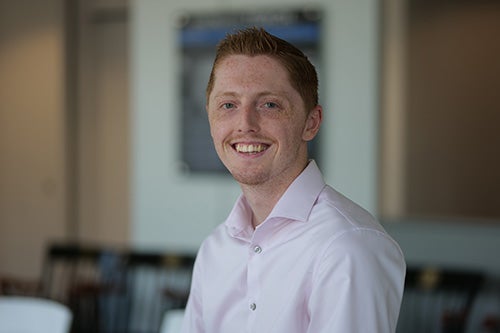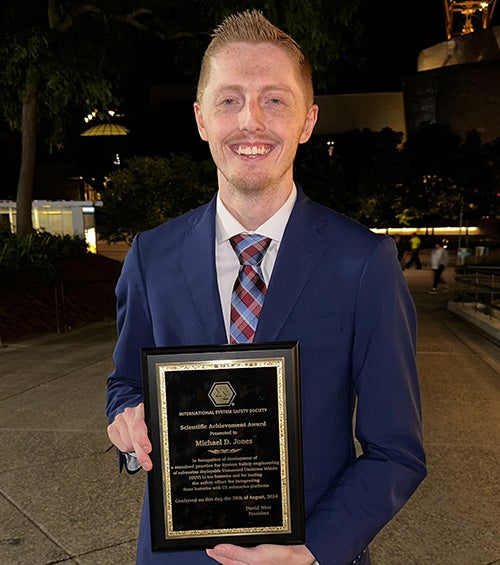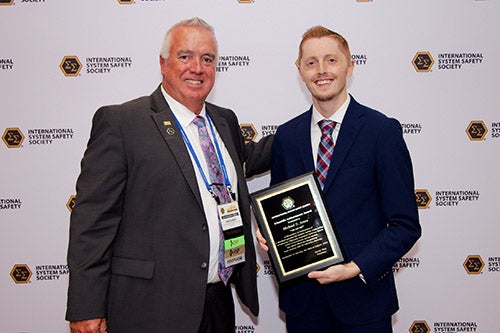Part-time Ph.D. chemical engineering student Michael Jones was awarded the 2024 Scientific Achievement Award by the International System Safety Society (ISSS) for contributions to the advancement of system safety.
Jones works full time for the Navy’s Naval Undersea Warfare Center (NUWC) Division Newport as an engineering task lead. He was recommended by his branch head and was selected for formal nomination by NUWC’s commanding officer, Capt. Chad Hennings.
The ISSS presents eight awards to deserving professionals each year. Jones won the Scientific Achievement Award, an award presented to an individual or group that has made significant contributions to the advancement of system safety through research and development programs.
“To receive this award is fulfilling and humbling,” Jones said. “When somebody else is thinking of you, it is a special thing and one to value in gratitude. To be nominated is a testament to the support I receive from my management and mentors at NUWC. To be selected is a testament to the global community of curiosity that makes our world a better place.”
The Islip, New York, native started at NUWC June 2020 as a contractor following his graduation from University of Connecticut. In 2021, he accepted a government role full-time. Jones was adamant in finding a job that would allow him to pursue advanced degrees while working in the industry full time. His aspirations were met with strong encouragement by NUWC, whose Part Time Academic Degree Training Program is funding the full tuition cost of his doctorate degree.


“The support at NUWC to pursue academia is phenomenal. They see how combining industry and continuing education benefits all,” said Jones.
Once Jones started in his new position, he discovered there was high demand for lithium-ion battery development and integration in submarine deployed unmanned undersea vehicles. In fall 2021, he started at URI as a non-matriculated graduate student to get a head start on classes. His application to the Graduate School was accepted for the spring 2022 semester, when he took the graduate class in transport phenomena and met his now dissertation advisor, Professor Arijit Bose.
“Dr. Bose reached out before the start of classes and asked if I was interested in batteries, which lined up so well with my current work and interests that I immediately replied ‘yes,’” said Jones.
Jones’ work with NUWC involves enabling the Navy fleet with frontline power and energy density through development of lithium-ion battery systems that are safe and reliable enough to integrate with U.S. submarines, which are one of the most safety-critical environments to exist. The purpose of Jones’ research with Professor Bose is to develop the next generation of lithium-ion battery cell design that more intrinsically meets these operational and safety requirements.
“Having a student from industry adds a critical dimension to the projects,” Bose said. “Mike understands real needs and requirements because he has to deliver products. He brings in that practical perspective not only to his own project, but also to other projects in the group, adding huge value to all our programs.”
Jones felt that his career start in system safety engineering provided the best opportunity to be quickly immersed in the largest possible array of engineering disciplines and application sets, and “without it, I would not have discovered my strong interest in batteries, and I would not have been privileged with the early opportunity to influence meaningful advancement in this critically emerging scientific community.”
He sees the significance of collaborations with programs such as the National Institute for Undersea Vehicle Technology, because “submarine requirements are some of the most difficult to satisfy; bridging the gaps between academia, the commercial industry, and the [Department of Defense] is the key to sustainably realizing this robust level of engineering standard practice.”
“Arguably the tool that has been most valuable to me in industry is something I learned in Professor Bose’s graduate transport phenomena class,” said Jones. “The ability to take an application of standard practice in one environment and draw analog from that baseline to new environments, to yield simple global solutions to complex local problems.”
Jones accepted his award Aug. 28 at the annual awards banquet during the International System Safety Summit and Training in Minneapolis, Minnesota.

